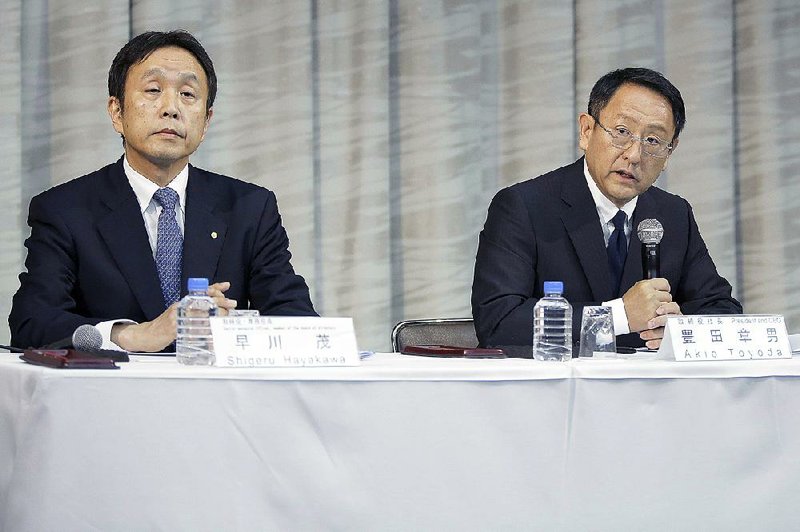TOKYO -- Toyota Motor was forthright about why it promoted a group of foreign and female managers this spring: The automaker wanted more diversity in an executive suite dominated by Japanese men.
Now the company finds itself defending its efforts to change after one of the executives it promoted, an American woman, was arrested on charges of illegally transporting a restricted painkiller into Japan.
Toyota spoke up in support of the executive, Julie Hamp, on Friday, a day after she was arrested. The company's president, Akio Toyoda, called her a "trusted and essential" aide and said he was confident she had not intentionally broken the law.
But fairly or unfairly, the case was being taken as a test of whether Toyota had miscalculated its decision to reshape its management to more closely reflect the global nature of business.
Toyoda spent most of a hastily arranged news conference fending off questions from Japanese reporters about whether he would reconsider the diversity drive in light of what one called the "special risks" of promoting foreigners. He responded repeatedly that he would not.
"There is no change to our policy of hiring qualified people with the right on-the-ground experience, regardless of their gender or nationality," he said.
He apologized that the case had caused "a stir" and said Hamp had "worked harder than anyone to adapt to Japan."
Drug-related transgressions carry a particularly strong social stigma in Japan, and prominent people caught breaking drug laws face media hounding and, often, ruined careers.
Toyota named Hamp, 55, its global head of public relations in March, elevating her from a similar position in North America. She is the first woman to reach a senior executive position at the company, and the first foreign executive to work for Toyota in Japan. She had joined Toyota from PepsiCo in 2012 and was still moving to Japan when she was arrested.
Toyoda added little detail to the outlines of Hamp's case. The police said customs inspectors found tablets containing oxycodone, a powerful painkiller, in a parcel she had sent to herself from the United States.
Oxycodone is legal in Japan if prescribed by a doctor, as it is in the United States, although doctors here are far more reluctant to recommend it. It can be imported for personal use only with special permission from the government, which the police said Hamp had not obtained.
Hamp was in custody and could not be contacted. She has not been formally charged; that decision can take up to several weeks in Japan, during which suspects often remain in jail.
According to Japanese news reports, Hamp is suspected of sending 57 tablets containing oxycodone from an address in Kentucky to a Tokyo hotel where she was staying while she looked for a home in Japan. She did not declare the tablets on the customs label, the reports said, only some plastic children's necklaces that were also in the parcel.
Hamp told the police she was not aware that she had broken any laws, according to the reports.
Oxycodone is widely prescribed in the United States in the form of drugs such as OxyContin and Percocet. But it is also widely abused. In Japan, it is usually reserved for extreme cases such as pain from advanced cancer. Per capita consumption is one-sixtieth the U.S. level, according to comparative statistics collected by the Ministry of Health, Labor and Welfare.
"This is a narcotic, not a medicine," said Manabu Fuchioka, head of the narcotics control division of the ministry.
Toyoda declined to say whether Hamp suffered from a medical condition that would require the use of a strong prescription painkiller such as oxycodone, or whether she had obtained the drug legally in the United States.
Hamp's promotion was announced in March along with that of several other foreign managers. A Frenchman, Didier Leroy, was named the automaker's first non-Japanese executive vice president, the most senior job at the company after the president and the chairman. Toyota also promoted its highest-ranking black official, Christopher Reynolds, to be its general counsel in North America.
Before the promotions, seven of Toyota's 57 senior executives and board members were citizens of a country other than Japan, and none were women.
Tatsuo Sasayama, a politician and social critic, took to Twitter to challenge Toyoda's claim that Hamp had been trying to assimilate in Japan.
"What do those words have to do with taking painkillers?" he said.
Business on 06/20/2015

